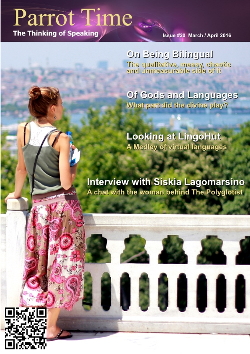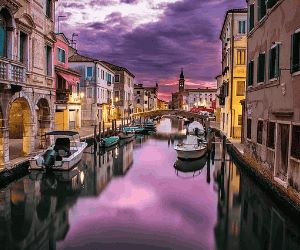Language Creation and Deities

|
Tower of Babel and Marduk Now, I consider religion to be personal, and so I have a personal favourite language deity. He may not even be directly associated with languages, but his famous building certainly is. The most famous construction in language history / mythology is, without a doubt, the Tower of Babel. 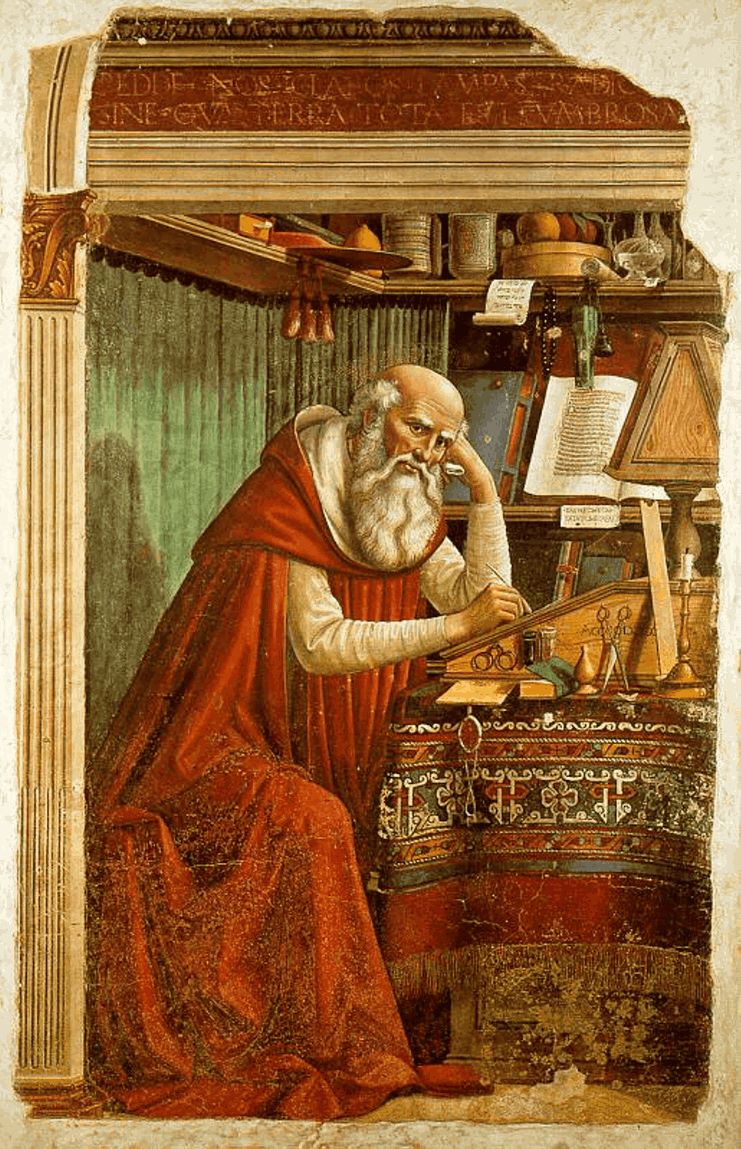 Saint Jerome in his Study According to the Book of Genesis in the Hebrew Bible, this was used to explain the origin of different languages. The story tells of a united humanity, a few generations after the Great Flood which was sent by God to cleanse the Earth of man's evils. These people had a single language and were migrating from the east, coming to the land of Shinar. There, they started to settle, building a city and then a great tower. They wanted to establish themselves so they would not be forgotten, and they wanted the tower to reach into the heavens. God, seeing this, and realizing that while they were unified, there was nothing they could not achieve, then "confused their language" so that they could no longer understand each other, after which they abandoned the tower. Thus the tower was named "Babel", allegedly after the Hebrew word balal, meaning "to jumble". I always found this part a little nonsensical, language wise. If the tower is only referred to as "Babel" after the people have been scattered, what did the original builders call it? They surely would not have called it "Babel", because that would have been somewhat predicting the future. Well, they did. The name actually was given by the Babylonians as "Babel", but it in Akkadian it means "Gate of God". The Christians just wanted to take credit for it later, by coming up with a supposedly similar word as the source of the name. From looking at the language deities and the stories behind language creation, it seems we like to both thank the gods for language while also blaming them for multiple languages. Perhaps though, as language lovers, the babelisation of single languages is seen more as a blessing, rather than a curse. So who were these people? According to the Bible, Babel formed part of Nimrod's kingdom, although it does not specifically say that Nimrod ordered the building of the tower. Nimrod was the king of Shinar, which is the name the Bible associates with Babylonia and the Mesopotamian region. There are the remains of a massive structure, called a ziggurat, in that region. The Etemenanki (Sumerian for "temple of the foundation of heaven and earth") was the name of this building, and it was dedicated to Marduk in the 6th century BCE ("Before the Common Era", a term used in place of "BC", since the latter refers to Christianity, and not all archaeologist are Christians). Marduk was the patron deity of the city of Babylon. He was associated with water, vegetation, judgement, and magic. Marduk's supremacy is described in the Babylonian creation story "Enûma Eliš", when he battles and defeats the chaos monster Tiamat. So what does Marduk have to do with languages? Well, strictly speaking, very little. But the way I see it, it was him to whom the tower was being built, the one that caused the Christian god to confuse the people into many languages. So, in a way, Marduk is the one who caused the birth of languages. So, for me, Marduk is my language god. When I want help in studying, I say "By Marduk's Tower". When something startles me, I say "Sweet mother of Marduk!", and when I am angry, I cry out "Marduk's marbles!". Okay. I don't really say those things, but I should. That would be cool. Babelisation 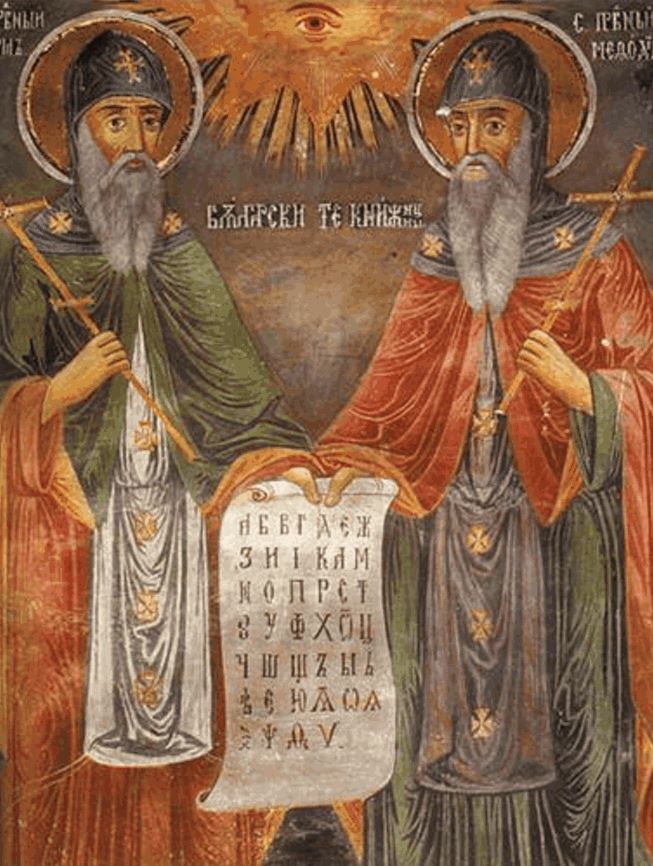 Saints Cyril and Methodius I have used the term "Babelisation" in this article before, and now you understand the context. It essentially means "the process by which a language is split into many", and while it takes its name from the Bible "Tower of Babel" story, it is a recurring theme in other language creation myths. Another story from the Bible is that of the Great Flood, in which a man named Noah built an ark and took many animals into it. Then God flooded the Earth, to destroy all the rest of mankind, for it had become too evil. Many cultures talk about a great flood, and some of those are connected with the creation or babelisation of languages. One example is the Aztec story about how only a single man, Coxcox, and a woman, Xochiquetzal, survived the flood by finding a piece of bark and using it to keep themselves afloat. When the water subsided and they found dry land again, they had many children. At first, these children were unable to speak, but then they were visited by a dove. This bird gave them the power of speech, however each child spoke a different language, and they could not understand each other. In Native North American tribes, the babelisation is often caused either by the flood dispersing the people to different regions, so their languages then diversify, or that the people do it to themselves. In the latter case, it could be because of an argument, a divine intervention commanding it, or even a creator who steps in directly and creates multiple tribes with different customs and languages. In Africa, the flood story becomes one of famine. A Wa-Sania (a Bantu people of East African origin) myth tells how once, everyone on Earth knew only one language, but when a severe famine occurs, a madness struck the people. They started wandering in all directions, jabbering strange words, and thus the languages of the world were created. Perhaps the strangest story comes from the people of Encounter Bay, in South Australia. The myth there tells of an old woman named Wurruri who would roam around with a stick, scattering the fires which others were sleeping around, thus putting them out. When she died, there was great rejoicing, and people came from all over to celebrate. As each tribe arrived, they descended upon the corpse of the woman and ate from it. Each tribe ate a different part of her body, and as such, began speaking a different language from the others. In the end, the tribes could no longer communicate with each other. Closing 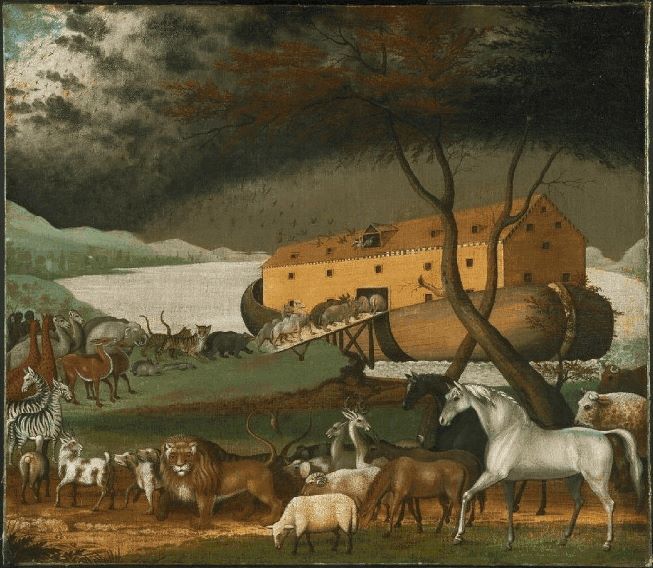 Noah's Ark, oil on canvas painting by Edward Hicks, 1846 I am always interested in exploring mythology, past and present (for what is religion but our currently accepted myths), because they can give us an insight into how we view and explain the world. From looking at the language deities and the stories behind language creation, it seems we like to both thank the gods for language while also blaming them for multiple languages. Perhaps though, as language lovers, the babelisation of single languages is seen more as a blessing, rather than a curse. After all, what we do if we still only spoke a single universal language? Are we already moving towards that as we expand English into the Lingua Franca of the world? Even if you are not religious, I hope you do take some time to think about where languages come from on a more fanciful level. Perhaps you might even find your own language god. But not Apollo. He is the only Greek and Roman god who bears the same name for both mythologies. He is the sun god, so he won't really help you much with languages. |
| Language Creation and Deities | ||||
| Writer: | Erik Zidowecki | |||
| Images: | ||||
| ||||
All images are Copyright - CC BY-SA (Creative Commons Share Alike) by their respective owners, except for Petey, which is Public Domain (PD) or unless otherwise noted.
comments powered by Disqus









